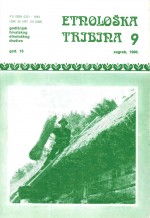O zadrugi v Beli Krajini
On the Zadruga in Bela Krajina
Author(s): Marjetka BalkovecSubject(s): Gender Studies, Customs / Folklore, Social history, Modern Age, Recent History (1900 till today), Cultural Anthropology / Ethnology, Rural and urban sociology
Published by: Hrvatsko etnološko društvo
Keywords: Bela Krajina; zadruga; customs; father or older son as an authority; gender roles;
Summary/Abstract: Zadruga, hišna or družinska zadruga are terms for a specific institution in which several nuclear families live and work together. Available literature discussing this phenomenon in southern Yugoslavia is rather extensive, yet little has been written on zadruga in Bela Krajina, a region in southeastern Slovenia. During the first half of the 16th century, certain parts of Bela Krajina were settled by Uskoki who were orthodox Serbs. Extended family households thus existed in those villages where Uskoki established their homes: in Marindol, Miliči and Paunoviči. Their zadruge shared common characteristics of the South Slav zadruga: the property was common, i. e. individual possession did not exist and everything earned by the household members went into a common purse; life-style was collective: everybody lived in the common house, except for young couples who could spend nights in small out-buildings (called is, his, košta or kašča); the authority of decision-making was with the zadruga master (gospodar, gazda), usually the father or older son. He organized work, made decisions regarding economy, planned and managed collective property. The matron (gospodarica, gazdarica) took care of household chores and controlled her daughters-in-law. The zadruga communicated with the larger social environment, mostly through common works, trade, wedding celebrations and emigration. There were several reasons for the break-up of zadruge. Many divided right after the Second World War, but the majority of zadruge disintegrated only in the 1960's. Wherever the common property is still undivided, ownership rights are unclear, which results in long disputes and lawsuits. As in other parts of Yugoslavia, the life-style in the Bela Krajina zadruga was also based on normative, idealized order, and on a practical cultural order of misrule and antagonism.
Journal: Etnološka tribina : Godišnjak Hrvatskog etnološkog društva
- Issue Year: 16/1986
- Issue No: 9
- Page Range: 103-109
- Page Count: 7
- Language: Slovenian

